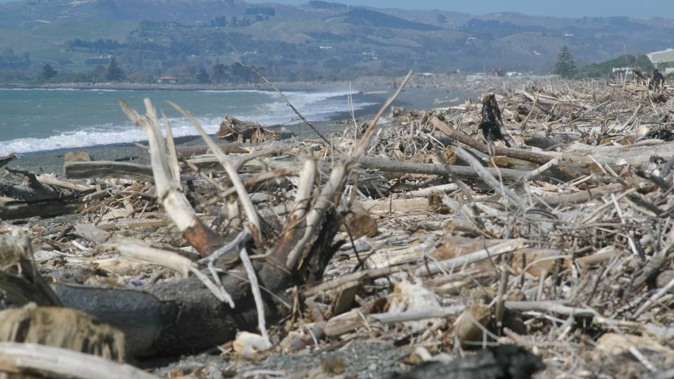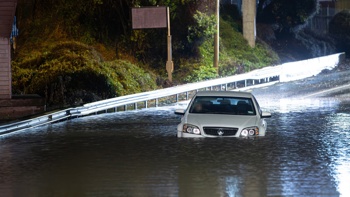
Firefighters in Hawke’s Bay say they are dealing with an “emerging” fire risk as people trying to clear wood debris from their cyclone-hit properties resort to burning it.
Fire and Emergency New Zealand community risk manager Nigel Hall said it was working with Hawke’s Bay Regional Council’s pollution response and enforcement team to address the risk of fires spreading on beaches, along flood plains and at private farms and homes.
He said there had been an increase in burn-offs and “nuisance fires” involving debris and rubbish in these areas after Cyclone Gabrielle sent a torrent of wood down rivers, damaging bridges and spilling onto properties.
“We’ve had a couple of difficult events near Wairoa due to the amount of debris on the beaches.”
The largest of these was a 1.8km wood debris fire on Blacks Beach near Nuhaka at 8.40pm on March 28.
The fire was 1km off the road, not accessible to firefighters, and there was a risk of it spreading into 80ha of maize crops and 10 nearby homes.
Firefighters monitored the fire for several hours before rain came and stayed overnight, extinguishing the fire.
Only a day earlier there had been a 30m-by-30m wood debris fire at nearly the same time along the same beach that was extinguished by firefighters.
There were 13 vegetation fires in Hawke’s Bay overall that led to fire service callouts during March, most of which were related to cyclone debris or rubbish burn-off.
/cloudfront-ap-southeast-2.images.arcpublishing.com/nzme/KZ4AWG2JNVFQBMDWBAYUSKXKTQ.jpg)
The remains of a wood debris fire along the beach near Awatoto, Napier. Photo / Paul Taylor
For people planning to burn debris, FENZ advice includes:
- Piles no bigger than 3m in circumference
- Built/placed on a green break 30m away from other combustible material on the prevailing downwind side with no debris leading up to other piles
- Heavier debris placed in the middle of piles
- Check district and regional authorities’ rules
- Minimise having silt and dirt among piles for a cleaner burn
- Keep piles away from under or near power lines
Hall said the general advice to firefighters was if the fire was not endangering life, threatening property or at risk of spreading, they should let it burn because the run-off from extinguishing could be worse for the environment and tie up resources.
Hawke’s Bay Regional Council regulation and policy group manager Katrina Brunton said while it was understood Cyclone Gabrielle had far and wide-reaching impacts across the community, it was important to continue to care for the environment.
“We are aware that as a result of the cyclone, there will be more burning of waste in the coming months, and that’s why we have teamed up with Fire and Emergency New Zealand to monitor burning,” Brunton said.
She said the regional council would be enforcing the regular air quality monitoring rules from May 1 where outdoor burning is prohibited in May, June, July and August for those properties in an airshed zone, including some flood-damaged areas in parts of Twyford and Whakatu.
An airshed is an area where air quality is likely or known to exceed the National Environment Standard.
Council advice and rules for outdoor burning includes burning only dry garden rubbish, untreated timber, paper and cardboard.
People must not burn any waste oil, wood treated with chemicals, painted wood, chipboard, plastic, asbestos, medical waste or chemical waste.
People can burn untreated timber — like wood debris from a cyclone — without a resource consent as long as smoke is minimised, isn’t a nuisance beyond your property boundary and there is little effect on other people and the environment.
People with questions about burning are advised to contact the pollution hotline at 0800108838.
According to Napier City Council, all fires are prohibited at beaches, parks and reserves at all times.
Under Hastings District Council’s jurisdiction, a permanent fire ban is in place on all Mahia Peninsula beaches, Waipatiki Beach and all Central Hawke’s Bay beaches.
Fires can be lit on other beaches during open fire seasons, provided the fire is not left unattended and is completely extinguished with water, while a permit is required during a restricted fire season.
Take your Radio, Podcasts and Music with you









